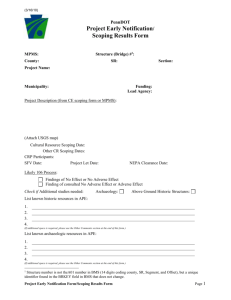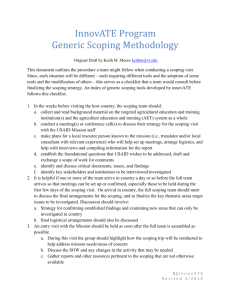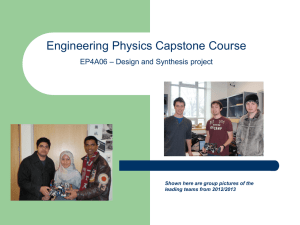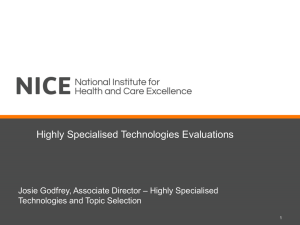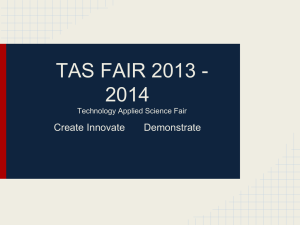1335217641_8
advertisement
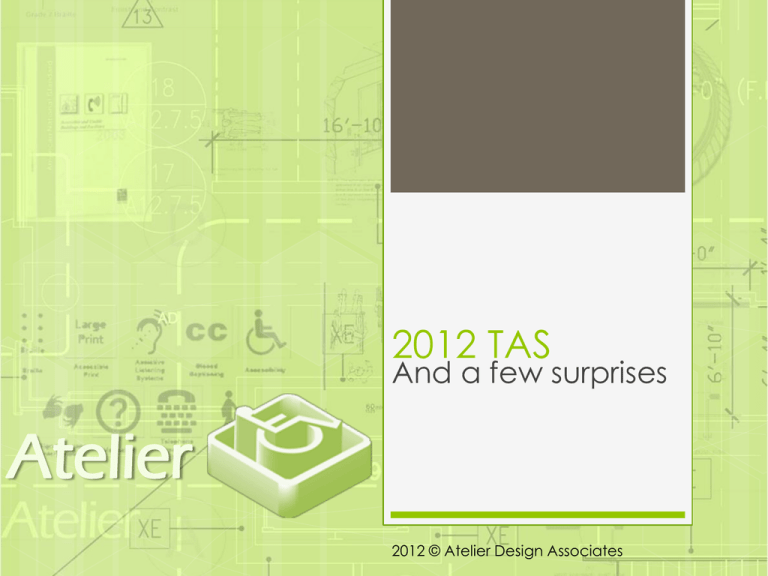
2012 TAS And a few surprises Atelier 2012 © Atelier Design Associates The information in this presentation is not a complete summary of the 2012 Texas Accessibility Standards (TAS). Remember to always apply the most stringent codes & regulations that may apply to your project. Application of items in this presentation may differ for various circumstances. XL Design Professional is a Registered Provider with The American Institute of Architects Continuing Education System. Credit earned on completion of this program will be reported to CES Records for AIA members. Certificates of Completion for non-AIA members are available upon request. This program is registered with the AIA/CES for continuing professional education. As such, it does not include content that may be deemed or construed to be an approval or endorsement by the AIA of any material of construction or any method or manner of handling, using, distributing or dealing in any material or product. Question related to specific materials, methods and services will be addressed at the conclusion of this presentation. . ‘Disability is a normal part of the human process’ Jim deJong Learning Objectives 1. 2. 3. 4. 5. Use of TDLR Rules & Standards How the new Standards are set-up Use of ‘Safe Harbor’ Importance of ‘Scoping’ Key differences from prior TAS TAS Plan Review Who actually reads their plan review ? Why would you want a comprehensive plan review? A nod & wink you drew a nice set of plans - or maybe Notify you if there are discrepancies that you can address before a change order Selecting your Accessibility Specialist Experience in your type facility Training Will they be sub-contracting my project? Proof of Submission Still required Submit plans no later than 20 days after date of issue Form 042AB Rules CH 68 Tells us where we apply the 2012 TAS Gives certain exemptions Rules Exemptions Variances Submittal Requirements Public ROW Projects Rules Ch 68.30 – 68.102 2012 TAS Ch 1 Application & Administration Ch 2 Scoping Ch 3-10 Technical Standards Ch1 Conventions & Calculations Referenced Standards Definitions Ch2 Scoping Tells us how to apply the technical sections Ch 3-10 Advisories 201.1 Advisory Scoping Are advisories enforceable? Yes where referencing another enforceable part of the standard Recommendations for good practice Effective dates Last date of building permit/permit extension Where no permit, actual physical start of construction On or after March 15, 2012 Safe Harbor When was it built? Did it fully comply before March 2012? 202.4 Safe Harbor What is covered under Safe Harbor? Compliant “Path of travel” elements What is not covered? Any other altered element Safe Harbor But it almost complies . . . Element by element safe harbor. Prior Variances do not apply RAS 2012-06 Safe Harbor Safe Harbor does not apply In existing facilities where supplemental requirements don’t exist in 1991 Standards What does that mean? Safe Harbor What if it costs too much to bring them into compliance? A minimum of 20% of costs shall be applied to accessible improvements Balance may be deferred only by Variance 202.4, 106.5.25 Safe Harbor What are “path of travel” elements? exterior approach parking restrooms telephones drinking fountains serving altered area 202.4 Path of Travel What if the tenant is making the improvements? funded in their entirety by the tenant with private funds and do not have funding, reimbursements, improvement funds of any kind provided by the landlord. 202.4 Ex 2 & RAS 2012-02 Barrier Removal Buyer beware. There is no obligation that pools must have a lift on or before March 15, 2012. There is an obligation for barrier removal in alterations & new construction. Postponed to May 21, 2012 ADA vs. TAS Program Access Program access vs. architectural compliance Keeping your client informed Difference between ADA & TAS ADA is a Civil Rights Law TAS is a Construction Law Title I Employee areas Title II Public Buildings Title III Commercial Religious entities under ADA guidelines under TAS guidelines Ch 68.30 (3) Elevator exemption Yes now in Texas . . Private Buildings Less than 3 stories or less than 3000 SF per floor unless a shopping center or healthcare provider … 206.2.3 Curb ramps no longer contrasting color & texture where within the site landing required at the top watch for new PROW standards 68.102 applies in PROW 406, 68.102 Tolerances New standards have built-in tolerances Use of Construction and Manufacturing Tolerances Advisory tells us what is good practice Should not be used as a proxy to overlook errors -Marsha Mazz 104 Importance of Scoping Tells us what type facility has to comply What elements within the facility have to comply Gives exceptions Chapter 2 Scoping No accessible route required if no pedestrian route is provided. Does not have to be paved. Be careful how this is used Never use this exception in Fair Housing . . . 206.2 Scoping Stairs are still not part of an accessible route. Automatic entry doors are not required unless . . . 206.2.3.1 Scoping Protruding objects in circulation paths Exceptions in children’s play areas Within areas of sport activity 204.1 Scoping Children’s play areas Shall provide accessible route within play area Shall connect entry & exit points with ground level play components and required elevated play components 206.2.17 Scoping Ambulatory Toilet Compartments One compartment required where 6 or more fixtures are provided in a Toilet Room Total count of water closets and/or urinals 213.3.1 Scoping Urinals Where only one urinal is provided, it is not required to be accessible Where two or more are provided, at least one shall be accessible 213.3.3 Scoping Exit signs Must have raised character & Braille 216.4, 703.1, 703.2, 703.5 Scoping Team or Player Seating At least one wheelchair space serving team or player seating 206.2.2, 221.2.1.4 Scoping Lawn Seating Where fixed seats are not provided, shall connect to an accessible route. 221.5 Scoping Assembly areas 221 Scoping Assembly areas 221 Scoping 221.2.2 Integration. Wheelchair spaces shall be an integral part of the seating plan. 221.2.3 Lines of Sight and Dispersion Choices equal to other spectators Technical Standards 304.3 Building Blocks Turning space may extend into toe & knee space below fixtures and other elements Technical Standards Reach Ranges Affects operating controls Light switches , outlets, fire alarm pulls, card readers, keypads Exemptions for certain outlets/controls HVAC Diffusers, certain outlets in Kitchens 308 Technical Standards Reach Ranges 308.2 & 308.3 Technical Standards Water Closets 16”-18” to center of fixture from side wall Lavatories prohibited from overlapping clear floor space Except in covered dwelling units Grab bars, shelves, dispensers may overlap clear floor space 604.2, 604.3.2 Technical Standards Water Closets Shorter grab bar permitted on rear wall where less wall space is provided due to special conditions 604.5.2 Technical Standards Toilet Rooms Fixtures shall not overlap door maneuvering clearance Door swing can overlap fixture clear floor space in single user Toilet 603.2.3 Technical Standards Toilet Paper Dispenser 604.7 Toilet Paper Dispenser Must clear 12” above grab bar & 1 ½” below grab bar Many large roll dispensers may not comply 609.3 Technical Standards may use alternate shower stalls 608.2 Technical Standards May use L-shape or straight seat in shower 610.3 Technical Standards Sign Locations 703 Technical Standards Sign Locations 703 Technical Standards Raised character & Braille 48”-60”AFF to bottom of letters To latch side of opening Or on face of door 703.4.2 With closer & no hold-open device On Push face of door Technical Standards Sinks in Kitchens Break Rooms wet bars 606.2 Technical Standards Kitchens, Break Room or Wet Bar parallel approach is permitted to a sink if no cooktop or conventional range is provided Or minimum 5%,at least one shall comply 606.2 Technical Standards Kitchens & Kitchenettes 50% of storage shall be accessible 804.5, 8.11 Technical Standards Assembly Seating No longer required in pairs Companion seats may be movable Companion seats must be equivalent to seating provided in the immediate area. Refer to Table 221.2.1 for quantity 802.3.2 Technical Standards 802 Assembly Seating Aisle seats 5% shall have folding or retractable armrests Designate with sign or marker 802.4 Technical Standards Benches 903 42” min width x 20”-24”deep Back support or fixed to a wall Technical Standards Dressing, Fitting & Locker Rooms Wheelchair space at end of bench Scoped at Min. 5% 222 & 803, 903 Top 5 changes in TAS 1. Elevator exemption 2. Toilet clearances 3. Curb ramps 4. Owner/Tenant responsibilities 5. Safe harbor in existing facilities Bonus! Advisories Stay tuned Questions? www.ada.gov www.license.state.tx.us/ab Michael Love ICC RAS IIDA APA www.accessAtelier.com 2012 TAS And a few surprises Atelier
